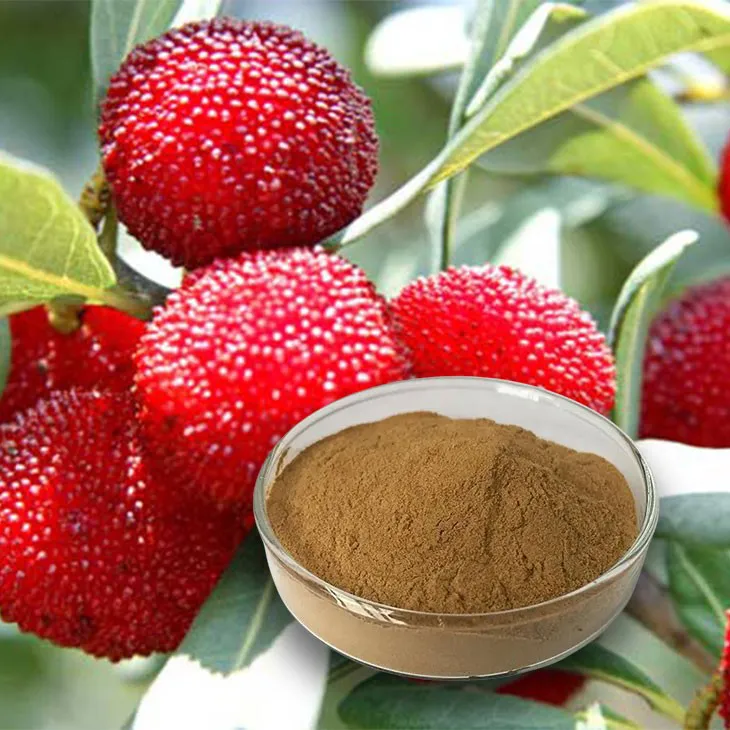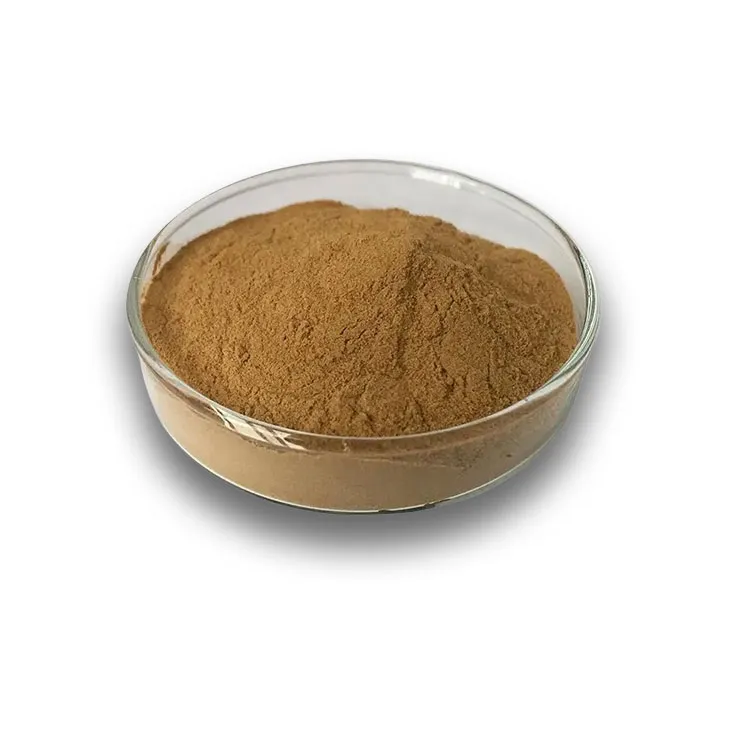- 0086-571-85302990
- sales@greenskybio.com
Supercritical Carbon Dioxide Extraction of Bayberry Extract.
2024-11-26

1. Introduction
The extraction of natural products has always been a topic of great interest in various industries, especially in the food, pharmaceutical, and cosmetic sectors. Bayberry, also known as Myrica rubra, is a fruit rich in various bioactive compounds. The traditional extraction methods for Bayberry Extract, such as solvent extraction, often have some limitations. However, the supercritical carbon dioxide extraction method offers a new and promising alternative. Supercritical CO₂ is a state of carbon dioxide where it has properties between a gas and a liquid. At the critical point (temperature of approximately 31.1 °C and pressure of approximately 73.8 bar), CO₂ exhibits unique solubility and diffusivity characteristics, making it an excellent solvent for extracting valuable components from bayberries.

2. Properties of Supercritical Carbon Dioxide
2.1 Solubility
Supercritical CO₂ has a variable solubility depending on the pressure and temperature conditions. It can selectively dissolve different components of bayberries. For example, it can dissolve the lipophilic compounds more effectively at certain conditions. This selectivity allows for the separation of specific active ingredients from the complex matrix of bayberries.
2.2 DiffusivityThe diffusivity of supercritical CO₂ is relatively high compared to liquid solvents. This means that it can penetrate into the cellular structure of bayberries more quickly, enabling a more efficient extraction process. It can reach the sites where the target compounds are located faster, reducing the extraction time and potentially minimizing the degradation of the active ingredients.
2.3 Low Toxicity and Environmental FriendlinessOne of the major advantages of using supercritical CO₂ is its low toxicity. It is a non - flammable, non - toxic gas under normal conditions. After the extraction process, it can be easily removed from the extract by simply reducing the pressure, leaving no harmful residues. Moreover, CO₂ is a common gas in the atmosphere, and its use in extraction processes has a relatively low environmental impact compared to some traditional organic solvents.

3. Comparison with Conventional Extraction Techniques
3.1 Solvent Extraction
Solvent extraction is a commonly used traditional method for Bayberry Extraction. Organic solvents such as ethanol or hexane are often used. However, these solvents may have some drawbacks. For example, they may leave residues in the extract, which can be a concern especially in the production of nutraceuticals and pharmaceuticals. Also, the extraction efficiency may not be as high as that of supercritical CO₂ extraction, as solvents may not be able to penetrate as effectively into the bayberry matrix.
3.2 Steam DistillationSteam distillation is mainly used for extracting volatile components from bayberries. However, this method may cause the degradation of some heat - sensitive compounds. In contrast, supercritical CO₂ extraction can be carried out at relatively lower temperatures, which is beneficial for preserving the integrity of heat - sensitive active ingredients in bayberries.

4. The Supercritical Carbon Dioxide Extraction Process of Bayberry Extract
4.1 Pretreatment of Bayberries
Before the extraction process, bayberries need to be properly pretreated. This usually includes cleaning to remove dirt and impurities, and sometimes drying or grinding depending on the requirements of the extraction process. For example, if a more concentrated extract is desired, drying and grinding the bayberries into a fine powder can increase the surface area available for extraction.
4.2 Extraction Parameters4.2.1 Temperature
The temperature plays a crucial role in the supercritical CO₂ extraction of bayberry extract. Generally, the temperature range is carefully selected to ensure the optimal solubility of the target compounds. For example, a temperature that is too high may cause the degradation of some active ingredients, while a temperature that is too low may result in a low extraction efficiency. Usually, a temperature between 40 - 60 °C is often considered suitable for bayberry extraction.
4.2.2 PressurePressure is another important parameter. Higher pressure can increase the density of supercritical CO₂, thereby enhancing its solubility. However, excessive pressure may also increase the cost and complexity of the extraction equipment. In the case of bayberry extraction, a pressure range of 200 - 300 bar is often explored to achieve a good balance between extraction efficiency and cost - effectiveness.
4.2.3 Extraction TimeThe extraction time affects the yield and quality of the bayberry extract. Initially, as the extraction time increases, the yield of the extract also increases. However, after a certain period, the increase in yield becomes marginal, and longer extraction times may even lead to the extraction of unwanted components or the degradation of the desired active ingredients. Typically, an extraction time of 1 - 3 hours is commonly used for bayberry extraction.
4.3 Separation and Collection of the ExtractAfter the extraction process, the supercritical CO₂ containing the dissolved bayberry components needs to be separated from the extract. This is usually achieved by reducing the pressure, which causes the CO₂ to return to its gaseous state, leaving behind the concentrated bayberry extract. The collected extract can then be further processed, such as purification or formulation for different applications.
5. Active Ingredients in Bayberry Extract and Their Preservation
Bayberries contain a variety of active ingredients, such as phenolic compounds, flavonoids, and anthocyanins. 5.1 Phenolic Compounds
Phenolic compounds in bayberries have antioxidant, anti - inflammatory, and antimicrobial properties. Supercritical CO₂ extraction can effectively preserve these phenolic compounds as it minimizes the exposure to harsh conditions such as high temperature and oxygen. The gentle extraction process helps to maintain the chemical structure and biological activity of these phenolic compounds.
5.2 FlavonoidsFlavonoids are another important class of bioactive compounds in bayberries. They are known for their antioxidant, anti - cancer, and cardioprotective effects. The supercritical CO₂ extraction method can selectively extract flavonoids without causing significant damage to their structure. This is because the extraction conditions can be precisely controlled to avoid extreme conditions that may lead to the degradation of flavonoids.
5.3 AnthocyaninsAnthocyanins are responsible for the red - purple color of bayberries and also possess antioxidant and anti - aging properties. These compounds are relatively heat - sensitive. Supercritical CO₂ extraction, with its ability to operate at relatively low temperatures, is highly suitable for extracting anthocyanins while preserving their color and bioactivity.
6. Applications of Bayberry Extract Obtained by Supercritical Carbon Dioxide Extraction
6.1 Nutraceuticals
The high - quality bayberry extract obtained by supercritical CO₂ extraction can be used in nutraceutical products. Due to its rich content of antioxidant active ingredients such as phenolic compounds, flavonoids, and anthocyanins, it can help in preventing oxidative stress - related diseases, improving cardiovascular health, and enhancing the immune system. For example, it can be formulated into dietary supplements in the form of capsules or tablets.
6.2 CosmeticsIn the cosmetics industry, bayberry extract can be used for its antioxidant and anti - aging properties. It can be added to skin care products such as creams, lotions, and serums. The extract can help in protecting the skin from free - radical damage, reducing wrinkles, and improving skin elasticity.
6.3 Food and Beverage IndustryBayberry extract can be used as a natural flavoring agent and a preservative in the food and beverage industry. Its unique flavor can enhance the taste of products such as juices, jams, and candies. Moreover, its antioxidant properties can help in extending the shelf - life of food products.
7. Challenges and Future Perspectives
7.1 High Equipment Cost
One of the main challenges in supercritical CO₂ extraction is the high cost of the extraction equipment. The equipment needs to be able to withstand high pressures and precise temperature control, which requires advanced engineering and high - quality materials. However, with the development of technology and increasing demand, it is expected that the cost of equipment will gradually decrease in the future.
7.2 Optimization of Extraction ConditionsAlthough there are general guidelines for the extraction conditions of bayberry extract using supercritical CO₂, further optimization is still needed. Different varieties of bayberries and different target active ingredients may require more customized extraction conditions. Future research should focus on finding the optimal combination of temperature, pressure, and extraction time for different applications.
7.3 Scale - up of the ProcessScaling up the supercritical CO₂ extraction process from laboratory scale to industrial scale is also a challenge. There are issues such as ensuring uniform extraction conditions, dealing with larger volumes of raw materials, and maintaining product quality. However, with continuous research and development, it is possible to overcome these challenges and realize the large - scale production of high - quality bayberry extract.
In conclusion, the supercritical carbon dioxide extraction of bayberry extract is a very promising method. Despite the current challenges, with further research and development, it has the potential to play an important role in the utilization of bayberries and the development of related industries.
FAQ:
What are the advantages of supercritical carbon dioxide extraction for bayberry extract compared to traditional extraction methods?
The supercritical carbon dioxide extraction for bayberry extract has several advantages over traditional extraction methods. Firstly, it can better preserve the active ingredients in bayberries. Secondly, the extraction process is highly controllable in terms of temperature, pressure and extraction time, which allows for customization of the extract's composition. This results in a purer and more concentrated bayberry extract.
How does supercritical CO₂ extraction ensure better preservation of bayberry active ingredients?
Supercritical CO₂ has unique properties at critical conditions. It is a relatively mild extraction medium compared to some harsher solvents used in traditional extractions. This mildness helps to avoid degradation or alteration of the active ingredients present in bayberries, thus ensuring better preservation.
Can you explain how the controllable factors in supercritical carbon dioxide extraction affect the bayberry extract?
Temperature, pressure, and extraction time are important controllable factors. Adjusting the temperature can influence the solubility of different components in supercritical CO₂. Pressure affects the density of supercritical CO₂, which in turn determines its solvent power. The extraction time determines how long the extraction process lasts. By carefully controlling these factors, we can customize the composition of the bayberry extract, for example, to obtain a higher concentration of certain desired active ingredients.
What are the potential uses of the supercritical carbon dioxide - extracted bayberry extract in nutraceuticals?
In nutraceuticals, the supercritical carbon dioxide - extracted bayberry extract can be used for its antioxidant and health - promoting properties. The high - quality extract obtained through this method can be formulated into various nutraceutical products. For example, it may be used in dietary supplements to provide antioxidant benefits, which can help in reducing oxidative stress in the body and potentially contribute to overall health improvement.
How pure is the bayberry extract obtained by supercritical carbon dioxide extraction?
The bayberry extract obtained by supercritical carbon dioxide extraction is relatively pure. Due to the high controllability of the extraction process, impurities are effectively removed. The customized extraction conditions can be set to target the extraction of specific components, leaving behind unwanted substances. However, the exact purity may vary depending on the specific extraction parameters used, but generally, it is purer compared to extracts obtained by some traditional extraction methods.
Related literature
- Supercritical Fluid Extraction of Bioactive Compounds from Fruits: A Review"
- "Advances in Supercritical Carbon Dioxide Extraction of Natural Products"
- "Bayberry: Composition, Bioactivity, and Potential Applications"
- ▶ Hesperidin
- ▶ citrus bioflavonoids
- ▶ plant extract
- ▶ lycopene
- ▶ Diosmin
- ▶ Grape seed extract
- ▶ Sea buckthorn Juice Powder
- ▶ Beetroot powder
- ▶ Hops Extract
- ▶ Artichoke Extract
- ▶ Reishi mushroom extract
- ▶ Astaxanthin
- ▶ Green Tea Extract
- ▶ Curcumin Extract
- ▶ Horse Chestnut Extract
- ▶ Other Problems
- ▶ Boswellia Serrata Extract
- ▶ Resveratrol Extract
- ▶ Marigold Extract
- ▶ Grape Leaf Extract
- ▶ blog3
- ▶ blog4
-
Standard - process rosemary extract.
2024-11-26
-
The Most Highly - Praised Cordyceps Extract.
2024-11-26
-
European bilberry extract suppliers.
2024-11-26
-
Panax Ginseng Leaf Extract
2024-11-26
-
Aguaje Extract
2024-11-26
-
melatonin extract
2024-11-26
-
Cassia Seed Extract
2024-11-26
-
Senna Leaf Extract
2024-11-26
-
Green Tea Extract
2024-11-26
-
Bayberry Extract
2024-11-26
-
Astaxanthin
2024-11-26
-
Chasteberry Extract
2024-11-26
-
American Ginseng Root Extract
2024-11-26




















